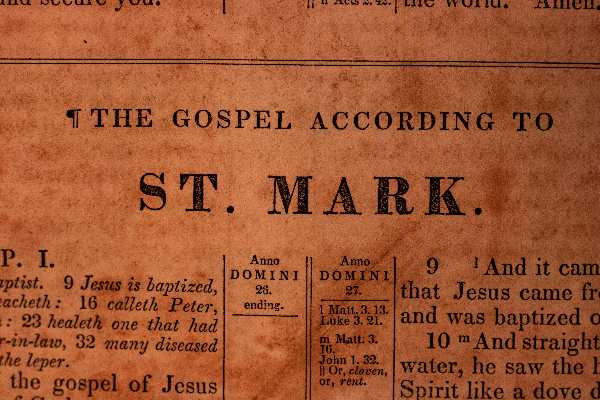
Advent with Mark
December 11, 2023 | Jim Neumann
I don’t know how often the prologue of Mark’s Gospel (1:1-15) is read as an Advent text, but my guess is not very often. (There are some lectionaries that use Mark 1:1-8 as an Advent reading, but none, as far as I know, that include the entire prologue through verse 15.) In the weeks leading up to Christmas, we are more likely to read from Matthew or Luke, whose beginnings indeed lead up to the birth of Jesus, than we are Mark. But when my own personal Bible reading brought me to the Gospel of Mark on the second day of Advent this season, it struck me as quite appropriate. After all, the word advent has two essential meanings, anticipation and arrival, and the beginning of Mark’s Gospel is all about anticipation and arrival.
A Long-Expected Visitation
In the first place, Mark announces the “beginning of the gospel of Jesus Christ” as the fulfillment of a long-awaited prophecy. In his words:
Just as it is written in Isaiah the prophet
“Behold, I send my messenger before your face,
who will prepare your way,
the voice of one crying in the wilderness,
‘Prepare the way of the Lord,
make his paths straight,’”John came baptizing in the wilderness and proclaiming a baptism of repentance for the forgiveness of sins.
(Mark 1:2-4)
In speaking of “the voice of one crying in the wilderness,” Mark in fact quotes from no other passage than Isaiah 40: the great chapter that foretells Yahweh’s return to his people in order to comfort them and bring them back from their long exile:[1]
Comfort, comfort my people, says your God.
Speak tenderly to Jerusalem,
and cry to her
that her warfare is ended,
that her iniquity is pardoned,
that she has received from the LORD’s hand
double for all her sins.A voice cries:
“In the wilderness prepare the way of the LORD;
make straight in the desert a highway for our God.
Every valley shall be lifted up,
and every mountain and hill be made low;
the uneven ground shall become level,
and the rough places a plain.
And the glory of the LORD shall be revealed,
and all flesh shall see it together,
for the mouth of the LORD has spoken.”A voice says, “Cry!”
And I said, “What shall I cry?”
All flesh is grass,
and all its beauty is like the flower of the field.
The grass withers, the flower fades
when the breath of the LORD blows on it;
surely the people are grass.
The grass withers, the flower fades,
but the word of our God will stand forever.Go on up to a high mountain,
O Zion, herald of good news;[2]
lift up your voice with strength,
O Jerusalem, herald of good news;
lift it up, fear not;
say to the cities of Judah,
“Behold your God!”
(Isaiah 40:1-9)
For those who know the Scriptures, it is plain that Mark is referring to the long-expected coming of Yahweh himself to restore his people. And as Isaiah prophesied, so John––a voice in the wilderness––comes. But more important, Jesus comes after him. As Mark tells the story, the Lord for whom John prepares the way––Yahweh, if we understand the Scriptures he quotes––is in fact Jesus, who indeed comes after John, as he himself says:
The one who is stronger than me is coming after me, of whom I am not worthy to stoop to untie the thong of his sandals. I have baptized you with water, but he will baptize you with the Holy Spirit.
(Mark 1:7-8, author’s translation)
And so it is that Jesus appears in v. 9, coming to be baptized by John: the Lord for whom he has prepared the way, on whom the very Spirit with which he will baptize others descends (v. 10).
The Time is Fulfilled
Hence, when Jesus says, “the time is fulfilled” at the opposite end of the prologue (v. 15), need we ask what time he means? It is the time of which Isaiah spoke! The time of the “good news” (Mark 1:1, 14; Isa 40:9)! Israel’s comfort! Yahweh’s visitation! The Lord comes! Indeed, he and his kingdom are “at hand” (Mark 1:15).
In between these two bookends of Mark’s prologue––the anticipation through Isaiah of Yahweh’s visitation and Jesus’s own declaration that “the time is fulfilled”––what do we find?
- Hints of a new exodus. As God once led his people out of bondage to Egypt, so he will lead them out of bondage to sin and death; [3]
- Hints of the day of the Lord: the great day of both final judgment and the final restoration of God’s people foretold by the prophets; [4]
- Hints of the one who will pour out the Spirit of God on human flesh as Ezekiel foretold; [5]
- Hints of Satan’s overthrow (his kingdom is at an end); [6]
- and in the center of it all the king himself: the Messiah and Son of God.[7]
All of this is part of what is “at hand” in Mark 1:15, what Mark refers to as “the gospel” in 1:1, 14. One is reminded of the movie title, The Theory of Everything. Yet the coming of Jesus is no theory, but rather fulfillment; the Ding an sich, the “thing in itself”, has arrived in his person.
At Advent, Christ comes; in Mark, Christ comes. He meets us in the midst of our painfully long waiting (1:2-3). In some ways, perhaps he leaves us waiting still for a birth narrative, for which we must wait for Matthew and Luke. He tells us nothing about Jesus’s actual origins––only that his coming is no less than God’s visitation upon his people, foretold long ago by Isaiah––and the prologue ends with the simple announcement that the time is fulfilled. Anticipation and arrival.
[1] Actually, Mark quotes both Malachi 3:1 and Exodus 23:20 (in v. 2) before quoting Isa 40:3 (in v. 3). But his decision to highlight Isaiah demonstrates the special importance that the latter has for him and probably also indicates that he means for the Malachi and Exodus quotations to be read through the lens of Isaiah’s prophecy as well.
[2] Most New Testament scholars today regard Isaiah 40:9 as the primary background of the concept of “gospel” or “good news” throughout the entire New Testament. The fact that Mark elaborates on “the gospel of Jesus Christ” in 1:1 by referring to Isaiah 40 is probably not an accident.
[3] See the use of Exod 23:20 in Mark 1:2 and the “new exodus” imagery taken from Isa 64:1 in Mark 1:10.
[4] See the use of Mal 3:1 in Mark 1:2 and the portrayal of John as Elijah, who returns before the day of the Lord according to Mal 4:5, in Mark 1:6, where John’s description matches that of Elijah from 2 Kgs 1:8.
[5] Cf. Mark 1:8 and Ezek 36:25-27.
[6] See Mark 1:12-13 and compare 3:22-27.
[7] See Mark 1:1, 11, both of which echo Ps 2:7, where God’s “Messiah” is also called his “Son” at his enthronement.






